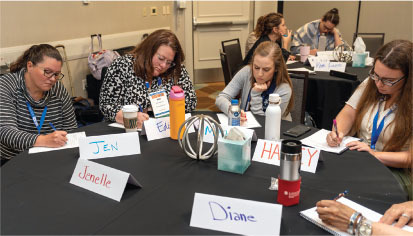July/August 2019
Leading Insight
Is Your Career Flickering? Check for Loose Connections.
BY SARAH MEUSBURGER
 What professional development goals do you have this year? Professional engineers are constantly relied upon to keep expanding their technical knowledge and abilities to meet the challenges of today and tomorrow. In fact, most PDH credits for professional engineers focus on the various technical aspects in each respective field.
What professional development goals do you have this year? Professional engineers are constantly relied upon to keep expanding their technical knowledge and abilities to meet the challenges of today and tomorrow. In fact, most PDH credits for professional engineers focus on the various technical aspects in each respective field.
Technical skills are important. No doubt about it. Those with the greatest technical skills, education, and experience are typically considered most valuable to any organization. However, professional development shouldn’t revolve only around technical skills.
What about strengthening your nontechnical skills? When is the last time you sought training on establishing relationships, or building client and human connections instead of cost estimation and professional liability? Nontechnical skills are just as important to your career, if not more so.
The ability to connect with others relies on your emotional intelligence or emotional quotient, commonly referred to as EQ. Those with high EQ are exceptional at reading people, building relationships, and connecting with others; those with low EQ struggle to connect.
Compelling research supports why this type of skill should be at the top of your list for professional development. According to thought leader and best-selling author Travis Bradberry, EQ is responsible for 58% of your overall job performance. Fortunately, your ability to connect with others is a skill that can be developed without attending a formal training program.
First, identify three primary groups of individuals that you interact with on a frequent basis. These are your pools of opportunity. As an example, perhaps these groups are clients, colleagues, and personal contacts. To harness the ability to connect with others, start with these elements.
- Authenticity: When you interact with others, be intentional about demonstrating your genuine interest in them. Listen to them with the primary goal of better understanding them and what’s important to them. As leadership expert John Maxwell says, “Make their agenda your priority.” Ask yourself if you are truly listening to what the other person is saying, or are you merely waiting for your turn to speak?
- Inquisitive Engagement: Ask questions that allow you to learn about the person you are interacting with. This affords you an opportunity to relate with them from more than one angle. Perhaps you have worked with a particular client, Bob, for the past five years. While your working relationship is good, you realize that you really don’t know anything about Bob outside of the project you are working on with him. Ask Bob about his plans for the upcoming weekend, and he may share that he’s going to a Little League tournament to watch his grandson play baseball. One small question often opens the door to other questions. Take that opportunity to ask more and learn more. Getting to know those you interact with is such an integral part of establishing genuine connections.
- Mindset of Service: If someone goes out of their way to help you or simply demonstrates a kind gesture, it has a positive impact on you. Practice a mindset of service by identifying opportunities to help others. If a new engineer comes to you with questions on a project, offer to sit down with them for coffee or lunch to share additional insight. This small gesture will be greatly appreciated and will allow them to benefit from your experience. If there’s a client that is particularly difficult to work with, resist the urge to minimize contact with them. Instead, schedule additional time to work with them so that a connection can be established.
- Quality of Presence: This element requires self-reflection. What is the quality of your presence? Do others look forward to working with you? QOP includes your attitude, voice tone, body language, sense of humor, empathy, and other factors. If you are perceived as someone who is disgruntled or always negative, for example, that adversely impacts your ability to connect with others. Conversely, if you maintain a positive outlook and genuine interest in others, people will absolutely look forward to working with you. Although it may seem insignificant when compared to your technical expertise, your attitude makes a big difference when trying to make genuine connections with others. Demonstrate a positive quality of presence.
- Maintain the Connections: It takes time to establish strong connections, and it takes intentional effort to maintain them. Consider using your calendar to schedule followup discussions. Pick up the phone or have in-person communication whenever possible. Email is an extraordinary tool, but it isn’t the best way to communicate if you want to strengthen connections with others.
If you want to strengthen your ability to connect with others, these elements are a good starting point. Be intentional about strengthening connections with each of the three groups of individuals that you’ve identified, then expand from there. You just may find that boosting your EQ helps you be a better engineer.
Sarah Meusburger is human resources director for Banner Associates Inc., a multidisciplinary engineering and land surveying firm based in Brookings, South Dakota.


 Volunteering at NSPE is a great opportunity to grow your professional network and connect with other leaders in the field.
Volunteering at NSPE is a great opportunity to grow your professional network and connect with other leaders in the field. The National Society of Professional Engineers (NSPE) encourages you to explore the resources to cast your vote on election day:
The National Society of Professional Engineers (NSPE) encourages you to explore the resources to cast your vote on election day:




